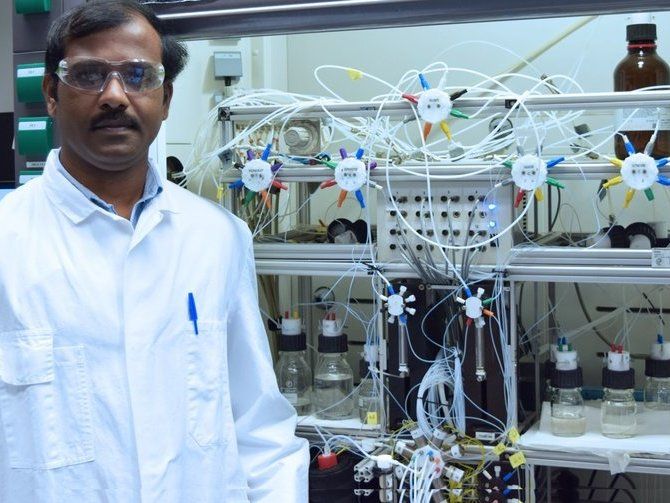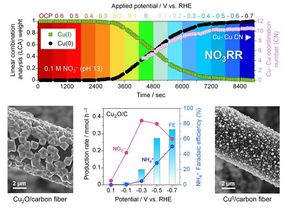Largest Synthetic Polysaccharide Assembled
Linear 100-mer polysaccharide within 188 hours
Advertisement
Chemists at the Max Planck Institute of Colloids and Interfaces (Potsdam, Germany) have set a milestone by preparing the two largest carbohydrates ever assembled. Using an Automated Glycan Assembly (AGA) instrument originally developed at the institute they prepared a linear 100-mer and achieved the completion of a 151-mer multiply branched polysaccharide. Preparing defined polysaccharides provides the basis to understand how these ubiquitous biopolymers serve their roles as materials.

Dr. Abragam Joseph in front of the home-built carbohydrate synthesis instrument.
© Dr. Murty
Carbohydrates are the most dominant biopolymers on earth. Polysaccharides such as cellulose are the building materials for plants and shells of chitin protect animals. Even though Nature produces 100s of millions of tons of cellulose and chitin each year, access to completely defined polysaccharides has proven extremely difficult.
Synthetic chemists have in recent years attempted to prepare long polysaccharides from single building blocks. The group of Prof. Xin-Shan Ye (Peking University) set a new record in 2017 when a tremendous group effort produced a branched 92-mer.
Linear 100-mer polysaccharide within 188 hours
Now, two chemists, postdoctoral fellow Dr. Abragam Joseph and PhD student Alonso Pardo-Vargas in the team led by Peter H. Seeberger, Director at the Max Planck Institute of Colloids and Interfaces (Potsdam, Germany) used an automated synthesis instrument to prepare a linear 100-mer polysaccharide within 188 hours from one building block.
The team illustrated that polysaccharide chains prepared by the automated AGA method such as 30-mers and 31-mers can in turn be combined to form polysaccharides of unprecedented size and complexity as illustrated by the 31+30+30+30+30 coupling to form a multiply branched 151-mer.
Defined polysaccharides open up insights to all aspects of carbohydrates
Access to complex polysaccharides are the basis for investigations into fundamental structural processes such as carbohydrate folding that is not understood until today. The ability to quickly and reliably prepare such defined molecules gives scientists the tools to study all aspects of carbohydrates that have so far been impossible due to a lack of pure carbohydrates.
“Even two years ago, I would not have dared to dream that it would be possible to prepare 100- and even 150-mer polysaccharides. Systematic improvements in our chemical methods combined with better automated coupling protocols provide us now with extremely interesting tools to better understand carbohydrates” say Peter H. Seeberger who initiated and supervised the study.”
Original publication
Other news from the department science
Most read news
More news from our other portals
See the theme worlds for related content
Topic world Synthesis
Chemical synthesis is at the heart of modern chemistry and enables the targeted production of molecules with specific properties. By combining starting materials in defined reaction conditions, chemists can create a wide range of compounds, from simple molecules to complex active ingredients.

Topic world Synthesis
Chemical synthesis is at the heart of modern chemistry and enables the targeted production of molecules with specific properties. By combining starting materials in defined reaction conditions, chemists can create a wide range of compounds, from simple molecules to complex active ingredients.



























































